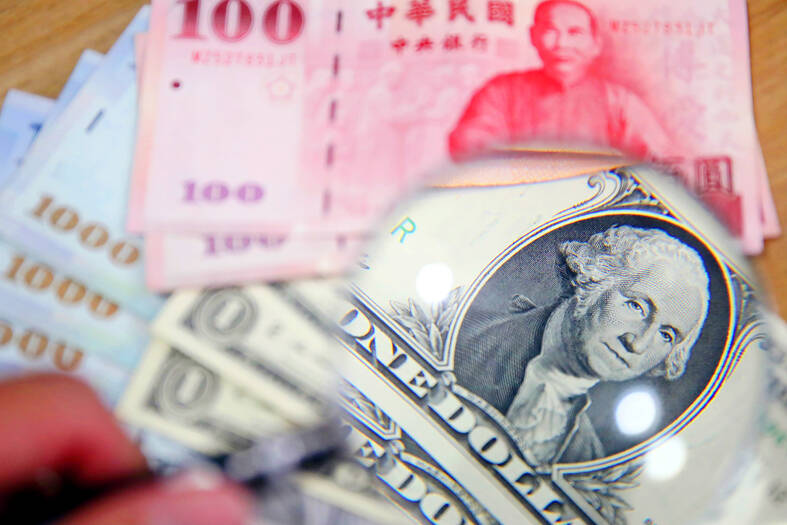The Financial Supervisory Commission is taking steps to reduce the burden of life insurers’ foreign-exchange hedging costs, which have risen because of the wide gap between Taiwan and US interest rates.
Local insurers would be allowed to apply to increase foreign exchange reserve (forex) volatility reserves from other reserve pools, Insurance Bureau Deputy Director-General Tsai Huo-yen (蔡火炎) said at a briefing yesterday in Taipei.
The changes would effectively boost insurers’ forex hedging reserves to as much as NT$960 billion (US$30.1 billion) from the current level of NT$300 billion, Tsai said. This would reduce their need for hedging tools like currency swaps and non-deliverable forwards, lowering hedging costs.

Photo: CNA
New rules would also double the so-called extra deposit and offset rate for the forex gains and losses of insurers’ unhedged assets and liabilities to 100 percent.
The New Taiwan dollar has declined about 4 percent this year against the greenback, with the local benchmark interest rate of 2 percent less than half of the 5.25 percent to 5.5 percent in the US.
The industry spent more than NT$360 billion hedging against foreign exchange fluctuations last year, commission data showed.
Taiwan first introduced the reserves mechanism in 2012, allowing insurers to deposit part of their forex gains to the pool and tap the funds to hedge against losses, in a way to smooth out their profits. It revised the rules in 2019 and again last year to increase the flexibility of forex risk management.
The total pool of reserves across life insurers increased 66 percent to NT$231 billion from the start of this year through last month, official data showed. While life insurers reaped forex gains of NT$923.7 billion so far this year thanks to a weaker NT dollar, hedging tool losses and costs totaled NT$894.2 billion.

TECH CLUSTER: The US company’s new office is in the Shalun Smart Green Energy Science City, a new AI industry base and cybersecurity hub in southern Taiwan US chip designer Advanced Micro Devices Inc (AMD) yesterday launched an office in Tainan’s Gueiren District (歸仁), marking a significant milestone in the development of southern Taiwan’s artificial intelligence (AI) industry, the Tainan City Government said in a statement. AMD Taiwan general manager Vincent Chern (陳民皓) presided over the opening ceremony for the company’s new office at the Shalun Smart Green Energy Science City (沙崙智慧綠能科學城), a new AI industry base and cybersecurity hub in southern Taiwan. Facilities in the new office include an information processing center, and a research and development (R&D) center, the Tainan Economic Development Bureau said. The Ministry

ADVERSARIES: The new list includes 11 entities in China and one in Taiwan, which is a local branch of Chinese cloud computing firm Inspur Group The US added dozens of entities to a trade blacklist on Tuesday, the US Department of Commerce said, in part to disrupt Beijing’s artificial intelligence (AI) and advanced computing capabilities. The action affects 80 entities from countries including China, the United Arab Emirates and Iran, with the commerce department citing their “activities contrary to US national security and foreign policy.” Those added to the “entity list” are restricted from obtaining US items and technologies without government authorization. “We will not allow adversaries to exploit American technology to bolster their own militaries and threaten American lives,” US Secretary of Commerce Howard Lutnick said. The entities

Minister of Finance Chuang Tsui-yun (莊翠雲) yesterday told lawmakers that she “would not speculate,” but a “response plan” has been prepared in case Taiwan is targeted by US President Donald Trump’s reciprocal tariffs, which are to be announced on Wednesday next week. The Trump administration, including US Secretary of the Treasury Scott Bessent, has said that much of the proposed reciprocal tariffs would focus on the 15 countries that have the highest trade surpluses with the US. Bessent has referred to those countries as the “dirty 15,” but has not named them. Last year, Taiwan’s US$73.9 billion trade surplus with the US

The Taipei International Cycle Show (Taipei Cycle) yesterday opened at the Taipei Nangang Exhibition Center, with the event’s organizer expecting a steady recovery in the industry this year following a tough last year. This year, 980 companies from 35 countries are participating in the annual bicycle trade show, showcasing technological breakthroughs and market development trends of the bicycle industry at 3,600 booths, the Taiwan External Trade Development Council (TAITRA, 外貿協會) said in a statement. Under the theme “Ride the Revolution,” the exhibition has attracted more than 3,500 international buyers from 80 countries to preregister for the four-day event, which is expected to